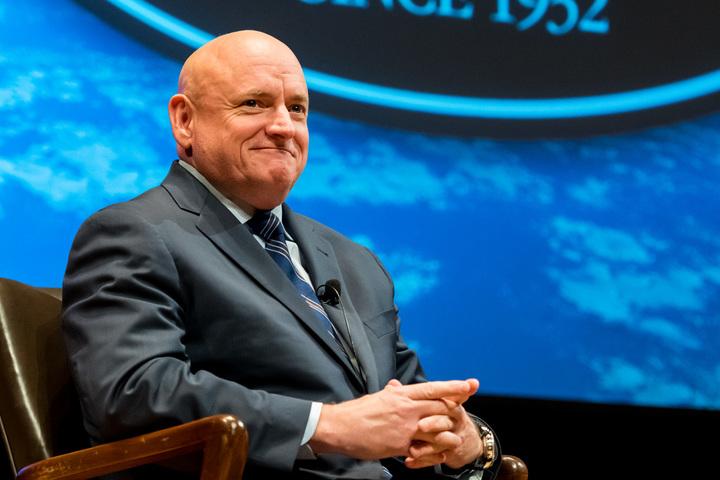By Riley Robinson, news staff
Captain Scott Kelly, former astronaut and Navy fighter pilot, spoke at the Back Bay Events Center Wednesday where he presented his new memoir and spoke about lesser-known details of his time in space.
Kelly has flown to space four times, three of them as a commander. In March 2015, Kelly began a NASA experiment, spending 11 months and three days on the International Space Station to study the effects of space travel on the human body. During this time, he sent photos and videos back to Earth via Twitter and Instagram and amassed more than 5 million followers across both platforms.
“My philosophy on this is if you’re asked to do something that’s really, really hard, yes you might try to get out of it, but in the end when you have to make the decision to do it or not, you take the hard job,” Kelly said. “That’s kind of how I got into the space station path.”
Harvard Book Store hosted the event and invited CNN and Frontline veteran Miles O’Brien to interview Kelly for more personal details.
Kelly spent several minutes talking about his relationship with his identical twin brother, Mark Kelly, who is also a former astronaut. They even interviewed for the NASA space program in the same navy blue suit. Kelly said when he walked in for his interview, he turned to the panel and said: “Bet this looks familiar.”
At this point Kelly joined the audience in laughter. He happened to be wearing another navy blue suit, but this time, when he crossed his legs, he also revealed his rocket-print socks.
“I have the only suit that’s been selected to be an astronaut twice,” Kelly said.
Kelly said the challenge and risk pulled him to work in space, but the obstacles during his longest expedition were more wide-ranging than he had originally expected.
“I’ve replaced people’s teeth in space,” he said.
He described facing over 2,000 switches in the cockpit of the shuttle, worried that if he flipped the wrong one, he would explode the spacecraft and kill the entire crew. Kelly asked NASA not to send him and his brother Mark on the same missions, because he felt their children would face too great a loss if they both died in space.
Kelly was also on a mission in 2011 when he learned Mark’s wife, Arizona Rep. Gabrielle Giffords, had been shot while meeting with constituents outside a Safeway grocery store. Giffords survived, but Kelly worried that other tragedies would strike while he was on the space station for an extended time.
“It was never the confinement, it was never the potential for physical risk, it was more like what could potentially be happening to my family on the ground,” Kelly said. “That’s the thing that really worried me while I was in space.”
Kelly was uneasy about the year-long mission when NASA first suggested it — it was more than twice as long as any of his previous trips. However, he eventually decided the contribution to science would be worth its difficulties. Kelly was the one who proposed the idea to compare his physiology to that of his twin back on Earth, which provided researchers with valuable data to use in preparation for a Mars mission.
Scientists estimate the flight to Mars would take approximately 200 days, which is much longer than any human had flown in space before. Scott and Mark Kelly’s nearly identical genetics provided researchers a control group to compare against Scott Kelly’s biology when measuring his potential bone, muscle and vision loss in space.
Dozens of audience members filed up to microphones to ask Kelly questions, many clad in star-print clothing or sporting NASA logos. Ariana Dube, 6, was the first in line. Dube had followed Kelly’s journey online with her parents, and now wants to go to space herself.
“When I have vacation days, I’m going to go into space with Santa and open a restaurant,” she said.
Elizabeth Wig, a third-year electrical engineering student at Northeastern, also attended the talk and left with a signed copy of Kelly’s book, “Endurance: A Year in Space, A Lifetime of Discovery.” Like Dube, she also followed Kelly’s dispatches from the space station.
“I’m a giant space geek,” Wig said. “And now I’m going to be on co-op with NASA in the spring. I’m super pumped.”
The end of the event took a political turn, as Kelly advocated for more scientists in politics. He said his 17 years in space made him an environmentalist, because he could see deforestation from the window of the International Space Station.
“While I was in space, I changed positions so many times, you would think I was running for president,” he said.
As the audience began to applaud after the final question, Kelly paused them to end on a hopeful note.
“This was built by this international partnership of 50 different countries, with different languages, different engineering standards,” Kelly said of the International Space Station. “This is the hardest thing we have ever done. If we can do this, we can do anything. If we want to go to Mars, we can go to Mars.”







![A demonstrator hoists a sign above their head that reads, "We [heart] our international students." Among the posters were some listing international scientists, while other protesters held American flags.](https://huntnewsnu.com/wp-content/uploads/2025/06/image12-1200x800.jpg)

